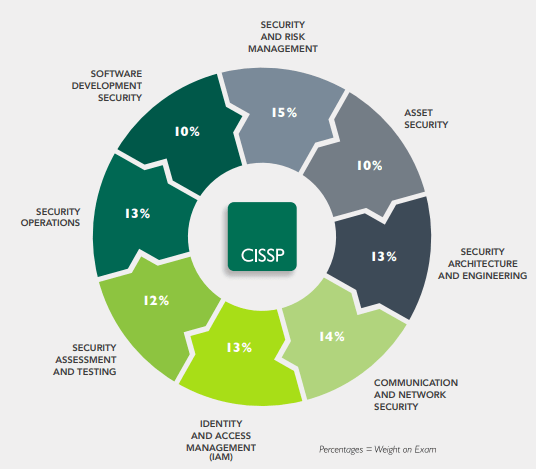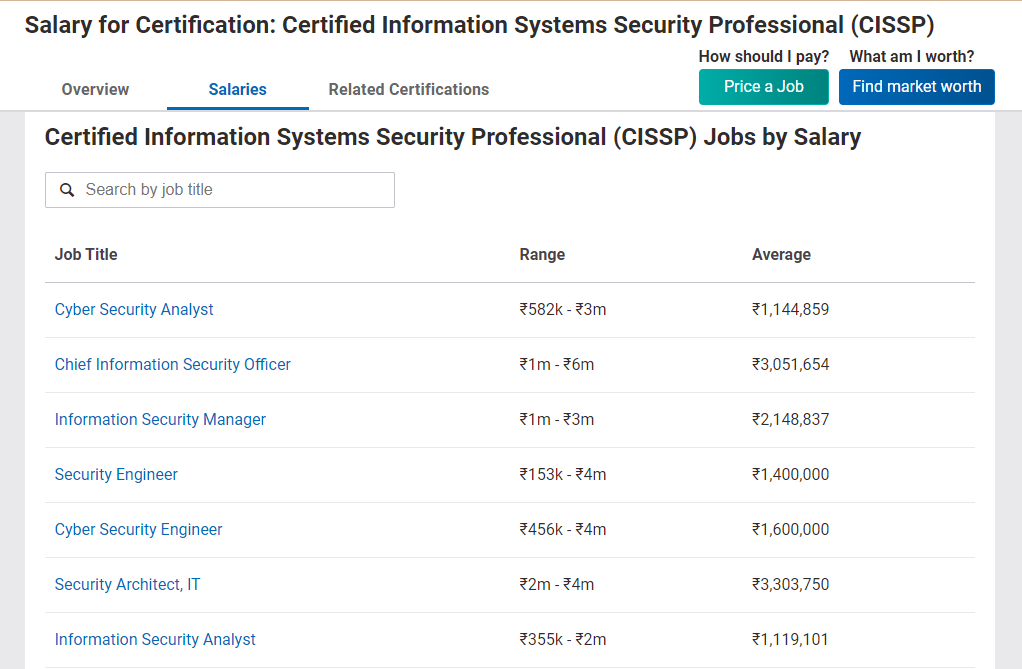Cyber Security and Ethical Hacking Internship ...
- 15k Enrolled Learners
- Weekend/Weekday
- Live Class
Framed for cyber security professionals, the Certified Information Systems Security Professional exam or CISSP is a globally recognised certification.
CISSP certification offered by ISSAP
First held in 1994 by the International Information Systems Security Certification Consortium, this certification examination has undergone many changes through the years to match the latest needs of cyber security. Especially the domains and core topics.
Currently, there are 8 domains of CISSP you need to master to pass the exam.
Let us look at the details of these domains, what changes you can expect in the upcoming exam and how to prepare for it!
Also known as CISSP CBK domains, CISSP has 8 major domains in total. These domains undergo frequent changes in terms of weighting. While the difference in weightage for CISSP domains in 2022 and 2023 wasn’t much, some of them are expected to change starting April 2024.
| CISSP Domains | Current Weightage (effective 1st May 2021) | Revised Weightage (effective 15th April 2024) |
|---|---|---|
| 1. Security & Risk Management | 15% | 16% |
| 2. Asset Security | 10% | 10% |
| 3. Security Architect & Engineering | 13% | 13% |
| 4. Communication & Network Security | 13% | 13% |
| 5. Identity & Access Management (IAM) | 13% | 13% |
| 6. Security Assessment & Testing | 12% | 12% |
| 7. Security Operations | 13% | 13% |
| 8. Software Development Security | 11% | 10% |
These are all the Top 8 CISSP domains list with their respective weightage and how they’ll change with the next update. If you’re also preparing for CEH v12 exam and wondering which one is better, check out CEH Vs. CISSP Certification, and assess which certification best aligns with your career trajectory.

Now that you know what are the 8 domains of CISSP, let’s dive deep into their syllabus and core concepts. We will explain all the CISSP domains and concepts individually for a clear understanding.
With 16% weightage, this is the most important domain in the CISSP exam. This domain has core concepts of security, risk management, security architecture, and engineering. Further, it focuses on the identification, analysis, and mitigation of security risks.
Its core concepts include:
This domain has a 10% weightage and covers the identification, classification, and protection of information assets. It focuses on safeguarding data, applications, hardware, and other IT resources.
The core concepts of this domain include:
With a weightage of 13%, this domain covers the design, implementation, and maintenance of secure information systems. Its emphasis mostly inclines towards secure design principles, security models, and secure system development methodologies.
The core concepts you need to know include:
As one of the most significant CISSP security domains, communication, and network security hold 13% weightage. This domain covers network security protocols, secure network design, and network attack mitigation techniques.
This domain includes core concepts like:
This domain holds a weightage of 13% and covers the identification, authentication, authorisation, and access control of users and systems. It focuses on user provisioning, access management, and identity federation.
Here are the key areas covered in this domain:
With 12% weighting, this domain explores the identification and assessment of security vulnerabilities in systems and networks. It focuses on vulnerability scanning, penetration testing, and security audits.
Some of the core concepts include:
This domain covers the day-to-day operations of an information security program. It has a 13% weighting in CISSP exams and focuses on aspects like incident response, security monitoring, and log management.
The core concepts include:
Among all the CISSP security domains, this one holds the least weighting, 10%. This domain covers the secure development of software applications. It focuses on secure coding practices, secure Software Development Lifecycles (SDLCs), and application security testing.
Here are the core concepts of this domain:
Now that we have covered the core curriculum offered under each domain, it is time to kickstart your CISSP exam prep. Here are a few valuable tips you can use to start your CISSP journey:

Did you know the CISSP salary after completing this certification can range anywhere between INR 800,000 to INR 30,00,000? Although actual salary figures can vary based on factors such as role, location, company, experience, etc., knowing that it is a lucrative and well-respected opportunity should be reason enough to help boost your preparations!
Related Post :How to pass CISSP
The CISSP exam includes several core security topics, ensuring that CISSP professionals get a well-rounded understanding of information security. While we have provided a detailed list of core topics covered, a structured path could really help you navigate this challenging exam with just the right steps.
Curious to know how?
Check out CISSP Certification Training Online offered by Edureka! This CISSP training program not only prepares you for the examination but also trains you on CISSP interview questions & answers to prepare you for the road ahead as well. So, enrol now to maximise your chances of success!
The number of domains in CISSP is 8. These domains include security and risk management, asset protection, security architecture and engineering, communication and network security, identity and access management, security evaluation and testing, security operations, and software development security.
The pass rate of the CISSP exam is around 20%.
Most people consider the CISSP exam to be harder than the PMP certification as CISSP requires knowledge of more topics, even if it is not in-depth.
Yes, the weightings of some domains are expected to change in 2024 for CISSP certification exam.
To qualify for the certification you need to pass all 8 domains of CISSP.
Yes, with dedication and guidance, you can pass the CISSP in 3 months.
Both certifications are highly valued in the field of cybersecurity. CISSP is more comprehensive, so some see it as a better course than CEH. However, if your focus is only on ethical hacking, then CEH would be a better option.
 Thank you for registering Join Edureka Meetup community for 100+ Free Webinars each month JOIN MEETUP GROUP
Thank you for registering Join Edureka Meetup community for 100+ Free Webinars each month JOIN MEETUP GROUPedureka.co